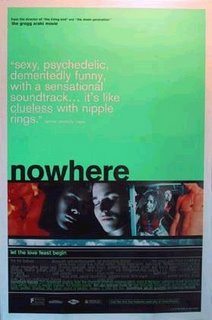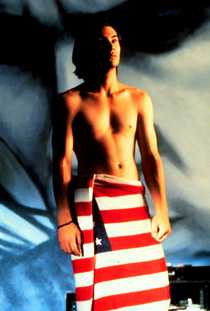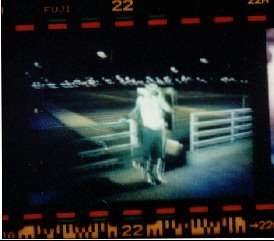Alienated
Day Four of Being Boring's Gregg Araki Blogathon!
 For all of the criticisms that The Doom Generation garnered, nothing could parallel the exorbitant schizophrenia of his follow up feature, Nowhere. Truly a symptom of an MTV dictated culture, the film finds the director both fascinated and equivocally repelled by a bustling generation of clean and taut youths. It's all about surface, glinting and glittery. Where prior teens have stretched out listening to Babyland on potable tape players, smoking and strumming their guitars, these teens go rollerblading on the Venice boardwalk or binge on obscene desserts, only to exude them in some fashionable bathroom stall. All of the lurking shadows of The Doom Generation have given way to an electric candy-colored phosphorescence which glosses over the abundant characters who populate this confused community of degenerates.
For all of the criticisms that The Doom Generation garnered, nothing could parallel the exorbitant schizophrenia of his follow up feature, Nowhere. Truly a symptom of an MTV dictated culture, the film finds the director both fascinated and equivocally repelled by a bustling generation of clean and taut youths. It's all about surface, glinting and glittery. Where prior teens have stretched out listening to Babyland on potable tape players, smoking and strumming their guitars, these teens go rollerblading on the Venice boardwalk or binge on obscene desserts, only to exude them in some fashionable bathroom stall. All of the lurking shadows of The Doom Generation have given way to an electric candy-colored phosphorescence which glosses over the abundant characters who populate this confused community of degenerates.
Doom, to this band of outsiders is not a possibility but a likelihood. In this barely alternate, frenetic reality of shortened attention spans, vanity conquers all - pleasure is the ultimate goal. Flitting between star-struck, subjugated and totally fucked up on God-knows-what, this seemingly endless roster of teenagers are slaves to their libidos. But empty consumption, Araki warns us, merely results in ruin. Egg strolls along the idyllic Silverlake reservoir with the unnamed Baywatch star, idealistically wooed by his flirtatious demeanor. Her gullibility results in a later scene of rape and battery. As she flees the affront, she weaves between a procession of uncaring automobiles. Stepping onto the curb, she is framed against a superficially serene billboard, not unlike the setting of the reservoir. Only here, isolated, among the grime of the bustling Los Angeles streets, the scene is gaudy and fake. Alyssa, too, takes Elvis as a lover because of his obscene masculinity. She is perpetually shown incapable of divorcing her romantic tendencies in the presence of this brute, but her subjugational desires backfire as she watches Elvis murder of a drug dealer he claims has duped him, cracking his head open with a can of Campbell's soup.
 Nowhere is Araki's most internal film. All of the action orbits around Dark (James Duval), the film's teenage protagonist. It could be claimed that the film's entire goings-on occur solely in his mind. But that would take all of the fun out of it. In the opening sequence he is shown masturbating in the shower. His erotic fantasy shifts rapidly. At first, we see him in bed with Mel, his pansexual "girlfriend" who believes that humans are made for sex and should seek as many partners as possible before "we're old and ugly and no one wants to touch us anymore." Then Montgomery, a sheepish boy so conflicted that even his genetics could not commit to matching irises. Finally, he envisions himself in the throes of polar dominatrixes Kris and Kozy. This rapid, episodic fluctuation is not merely indicative of the contemporary aesthetic approach the film will assume (and Araki does hand over his initial Neo-realist style camera work for a super fast MTV like editing style) but of the culture which the film depicts. No longer capable of setting on just one thing, this frenzied searching for the the perfect fantasy will prove the foil to all of our teenagers, as, in the fractured focus of their search they become unable to fulfill any desire. The camera, too, in its perpetual state of movement, ends any sort of human connection to its subjects.
Nowhere is Araki's most internal film. All of the action orbits around Dark (James Duval), the film's teenage protagonist. It could be claimed that the film's entire goings-on occur solely in his mind. But that would take all of the fun out of it. In the opening sequence he is shown masturbating in the shower. His erotic fantasy shifts rapidly. At first, we see him in bed with Mel, his pansexual "girlfriend" who believes that humans are made for sex and should seek as many partners as possible before "we're old and ugly and no one wants to touch us anymore." Then Montgomery, a sheepish boy so conflicted that even his genetics could not commit to matching irises. Finally, he envisions himself in the throes of polar dominatrixes Kris and Kozy. This rapid, episodic fluctuation is not merely indicative of the contemporary aesthetic approach the film will assume (and Araki does hand over his initial Neo-realist style camera work for a super fast MTV like editing style) but of the culture which the film depicts. No longer capable of setting on just one thing, this frenzied searching for the the perfect fantasy will prove the foil to all of our teenagers, as, in the fractured focus of their search they become unable to fulfill any desire. The camera, too, in its perpetual state of movement, ends any sort of human connection to its subjects.
 For this is the MTV generation, Araki is a tad too quick to remind us. Nowhere marks the first Araki film to physically depict the guardians of our teenage protagonists. Here they are cast with flash-back figures of television sitcoms. The Love Boat, The Brady Bunch, The Facts of Life, Empty Nest and, well, Beverly D'Angelo play the parents and authority figures. Television having a greater affect on the brood than genealogy ever could. Our protagonists themselves are a veritable who's who of Nineties film. Ryan Phillipe, Heather Graham, Scott Caan, Mena Suvari and Christina Applegate make up but a small portion of our immense cast. Even mere passers by are super-Celebs like Denise Richards and Tracy Lords. Yet, in addition to playing the "Oh, its so and so" game ('cause rest assured, you do) this insanely exhaustive casting endows the film with an eerie meta-reality, as though, this is in fact what occurs when the cameras stop rolling.
For this is the MTV generation, Araki is a tad too quick to remind us. Nowhere marks the first Araki film to physically depict the guardians of our teenage protagonists. Here they are cast with flash-back figures of television sitcoms. The Love Boat, The Brady Bunch, The Facts of Life, Empty Nest and, well, Beverly D'Angelo play the parents and authority figures. Television having a greater affect on the brood than genealogy ever could. Our protagonists themselves are a veritable who's who of Nineties film. Ryan Phillipe, Heather Graham, Scott Caan, Mena Suvari and Christina Applegate make up but a small portion of our immense cast. Even mere passers by are super-Celebs like Denise Richards and Tracy Lords. Yet, in addition to playing the "Oh, its so and so" game ('cause rest assured, you do) this insanely exhaustive casting endows the film with an eerie meta-reality, as though, this is in fact what occurs when the cameras stop rolling.
Throughout the film, Dark begins to witness the alien abduction of the city's errant souls. Beginning with the val chicks (Tracy Lords, Shanon Daugherty, and Rose McGowan) who sit on a bus bench inanely chattering about their social circle, Dark witnesses an alien walk up to the girls, raise his gun and blast them into oblivion. Later, the alien will return to claim Dark's ill fated paramour, Montgomery. This literal alienation serves as Dark's great foil. His inability to shed the morbid romanticisms of past generations results in his abject isolation.
 For all of its sexy and sumptuous veneer, Nowhere is a rather simplistic venture. Figures like John Ritter's maniacal Mo$e$ Helper are too obvious of jabs for Araki's cinema, which more often than not contains deceptively complex metaphors and juxtapositions. What's more, merely following the set style of a generation and using that vehicle as a means by which to destroy does not ultimately prove to be a satisfying means subverting. Nowhere ultimately feels as though Araki is succumbing to the system than critiquing it. But he's still there. There's a scene towards the film's close where someone spots Bob, the hermaphrodite porn star. In Nowhere's reality, this would be a revelation. As the ultimate aim is gratification, and not fulfillment, alienation is the only possibility and the quest for the ultimate pleasure inevitably leads nowhere.
For all of its sexy and sumptuous veneer, Nowhere is a rather simplistic venture. Figures like John Ritter's maniacal Mo$e$ Helper are too obvious of jabs for Araki's cinema, which more often than not contains deceptively complex metaphors and juxtapositions. What's more, merely following the set style of a generation and using that vehicle as a means by which to destroy does not ultimately prove to be a satisfying means subverting. Nowhere ultimately feels as though Araki is succumbing to the system than critiquing it. But he's still there. There's a scene towards the film's close where someone spots Bob, the hermaphrodite porn star. In Nowhere's reality, this would be a revelation. As the ultimate aim is gratification, and not fulfillment, alienation is the only possibility and the quest for the ultimate pleasure inevitably leads nowhere.

0 Comments:
Post a Comment
<< Home